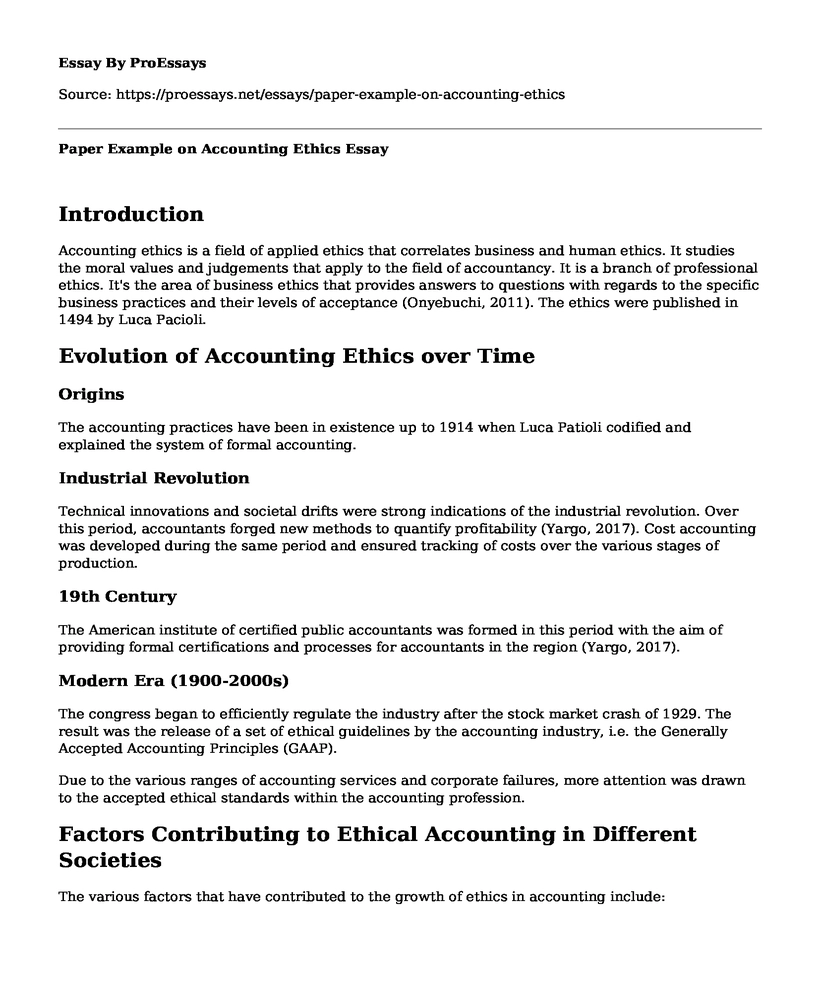Introduction
Accounting ethics is a field of applied ethics that correlates business and human ethics. It studies the moral values and judgements that apply to the field of accountancy. It is a branch of professional ethics. It's the area of business ethics that provides answers to questions with regards to the specific business practices and their levels of acceptance (Onyebuchi, 2011). The ethics were published in 1494 by Luca Pacioli.
Evolution of Accounting Ethics over Time
Origins
The accounting practices have been in existence up to 1914 when Luca Patioli codified and explained the system of formal accounting.
Industrial Revolution
Technical innovations and societal drifts were strong indications of the industrial revolution. Over this period, accountants forged new methods to quantify profitability (Yargo, 2017). Cost accounting was developed during the same period and ensured tracking of costs over the various stages of production.
19th Century
The American institute of certified public accountants was formed in this period with the aim of providing formal certifications and processes for accountants in the region (Yargo, 2017).
Modern Era (1900-2000s)
The congress began to efficiently regulate the industry after the stock market crash of 1929. The result was the release of a set of ethical guidelines by the accounting industry, i.e. the Generally Accepted Accounting Principles (GAAP).
Due to the various ranges of accounting services and corporate failures, more attention was drawn to the accepted ethical standards within the accounting profession.
Factors Contributing to Ethical Accounting in Different Societies
The various factors that have contributed to the growth of ethics in accounting include:
Integrity
This is a vital element of the profession and requires accountants to be forthright and honest with their client's financial information (Vitez, 2018).
Objectivity and Independence
This factor ensures that accountants remain free from conflicts of interest and any biased business relationships in the course of their accounting services.
Due care
This factor ensures that accountants exercise diligence, competence and adequately understand the financial information by the generally accepted accounting principles (GAAP).
What We Learn from the Various Applications of Accounting Ethics?
Auditors and accountants should observe the code of ethics to maintain their independence while expressing their opinion on financial matters.
The accounting profession has vital responsibilities to the public.
It's the responsibility of auditors to implement the code of ethics to ensure reliability and accountability.
How Governments Have Handled Accounting Ethics over Time?
Various countries have enforced the accounting laws but customized then by their jurisdictions, i.e. Germany has her accounting legislation governed by the "tax law," the United Kingdom by the "company law" and Sweden by "accounting law." The countries also have their organizations regulating the accounting process, i.e. he US have Financial Accounting Standards Board (FASB).
The Contribution of Luca Pacioli to the Understanding of Accounting Ethics
Luca Pacioli, also known as the father of accounting codified and explained the system of formal accounting in 1934. He highlighted the significant role played by ethics in the accounting profession. He is a Franciscan fair who wrote the first official accounting manifesto called "Summa de Arithmetica, Geometria, Proportioni et Proportionalita." Luca explained double-entry accounting as a system where credit in one account is reflected by a corresponding debit in another account. He also provided an interconnected network of capital, liability, income and expenses and their relation to the ethics of accounting (Yargo, 2017).
References
Onyebuchi, V. N. (2011, 06 10). Ethics in accounting. Retrieved from International journal of business and social sciences: http://www.ijbssnet.com/journals/Vol.%202_No._10%3B_June_2011/29.pdf
Vitez, O. (2018, 03 28). Ethics in the accounting profession. Retrieved from Chron.com: http://smallbusiness.chron.com/ethics-accounting-profession-3738.html
Yargo, J. (2017, 07 05). Evolution and history of accounting . Retrieved from Career trend: https://careertrend.com/about-6630389-evolution-history-accounting.html
Cite this page
Paper Example on Accounting Ethics. (2022, May 26). Retrieved from https://proessays.net/essays/paper-example-on-accounting-ethics
If you are the original author of this essay and no longer wish to have it published on the ProEssays website, please click below to request its removal:
- Research Paper Example on Accounting in a Firm
- International Financial Reporting Standards: The Pros and Cons
- Calculate Grades Easily with Excel Spreadsheet
- Changing Categorization of Races: Impact of Science, Politics, and Public Attitudes
- Essay Example on Global Financial Reporting Standards: Consistency and Comparability
- A New Year, a New Love: A Single's Journey to Happiness
- Paper Sample: An Overview of Accounting Transfer Research at Three Florida Universities







